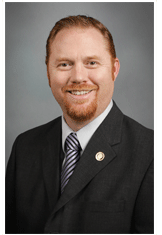JEFFERSON CITY, Mo. – While most Republicans in the Capitol have expressed their displeasure with the current state of affairs at the University of Missouri, Sen. Eric Schmitt, R-Glendale, has taken steps and made efforts to make the university more transparent. First, he filed a bill that would audit the university’s finances, but now he has another piece of legislation that would require public universities and colleges to post syllabi, reading lists, and other class requirements on the university’s website.
Schmitt made it clear in his testimony that the legislation originated from revelations surrounding University of Missouri professor Melissa Click, who has become a focal point in the debate around the university for her role in the Concerned Student 1950 protests last November. Click, a communications professor who specializes in gender, race and class examinations of popular culture, has published work that investigates the popular teen Twilight novel series, Martha Stewart’s arrest, and Lady Gaga to name a few.

Schmitt wants transparency so taxpayers who provide for the institution can see how the university uses their money.
“Maybe a class on Lady Gaga is important, maybe it’s not,” Schmitt said in his testimony. “At least people get a chance to see it.”
However, Sen. Jason Holsman, D-Kansas City, who is also an adjunct professor for the University of Phoenix, noted that the hardest part of making a class was writing the syllabus and arranging the course materials.
“That syllabus is unique to my approach within the curriculum goals,” Holsman said. “I construct the five-week or eight-week course to generate it. I understand if anyone could just copy and paste anything I’ve done, it takes away the hours I’ve spent done to do that.

“Execution of the syllabus is not where the difficulty lies, the difficulty lies in creating a syllabus.”
The University of Missouri expands on that explanation by noting that professors at all levels effectively own their own syllabi, not the university. Thus, those syllabi can be protected under U.S. copyright and trademark laws. The Missouri Supreme Court declined to hear a case in 2014 between the National Council on Teacher Quality and the University of Missouri, siding with the Court of Appeals decision that syllabi should remain private.
Schmitt says at this point the matter is a battle over who is valued: the teachers or the taxpayers. Schmitt also believes that transparency would have a lot of benefits, not only for taxpayers but for prospective students of Missouri’s four-year universities.
“I think there’s a lot of power in that information,” he said.






